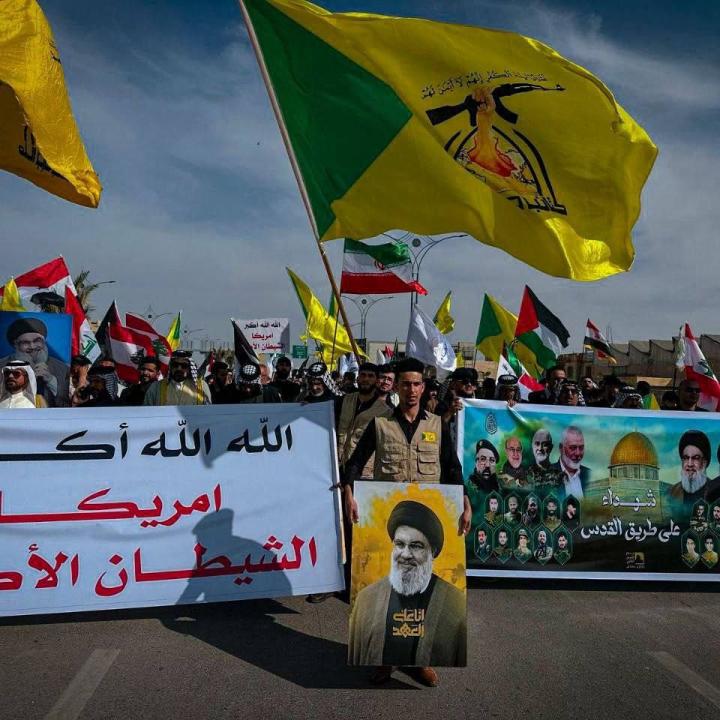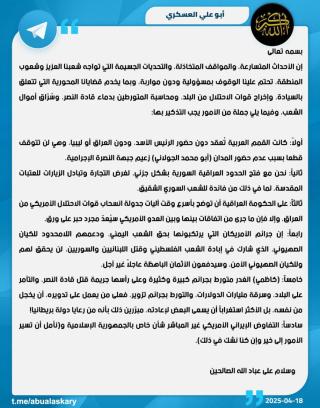

Kataib Hezbollah’s (KH) anonymous spokesperson released his first statement since October 2024
On April 18, the individual(s) behind Kataib Hezbollah’s (KH) anonymous spokesperson account released a statement on Telegram. The statement, Abu Ali al-Askari’s first since October 2024, and appears to focus on a range of policy interests and threats facing KH. A translation is shown in Figure 1.
Having not made any statements since October, Abu Ali clearly has a lot of ground to cover. His statement is interesting as a likely statement of policy for some or all of KH’s membership:
- Oppose rehabilitation of Ahmad al-Sharaa and the new Syrian government. KH and other Shia groups in Iraq are particularly nervous about the motives of the new Syrian authority. Iran, KH, and other Shia militias fought against the groups now in control of Damascus. Abu Ali highlights the Sunni extremist past of Syria’s new leader, Ahmad al-Sharaa (AKA al-Jolani), while suggesting Syria need not be rehabilitated into the international community. Notably, KH and other self-styled resistance (muqawama) groups protested bitterly when the Government of Iraq (GOI) invited al-Sharaa to Baghdad last week.
- Re-secure border crossings and supply routes into Syria. The fall of Assad was a great setback for Iran, KH, and other muqawama militias. The loss of Syria means a loss of control over lucrative economic resources, military bases, and strategically important supply and facilitation routes. In the immediate aftermath of the defeat, many Shia militias evacuated to Iraq – but since then some have reinserted under the cover of pilgrimage to protect holy Shia shrines. Re-securing some control over positions and supply lines into and through Syria is likely a key priority for Iran and for KH, as a prerequisite for resupplying other proxies such as Lebanese Hezbollah, developing new irregular warfare options against the new authorities, and re-securing economic assets.
- Continue to push for expulsion of U.S. troops. Pushing the U.S. out of Iraq and the wider region is a long term KH and muqawama objective. It looked like that objective was close to being met last fall when the U.S. announced an agreement with Iraq’s government to conclude coalition operations by late 2025. Since then, however, some Iraqi leaders are reported to have expressed interest in extending the withdrawal (likely in response to fears of instability emanating from Syria). These rumors are likely to concern KH leadership and grassroots members, who have seen the U.S. fail to withdraw before and will likely become restless if it appears a withdrawal is no longer likely.
- Remain ready to attack the U.S. and Israel. KH has effectively been subject to an Iranian imposed ceasefire for over a year. Its rank-and-file members are likely frustrated at impotently watching from the sidelines during ongoing operations by the IDF in Gaza, and while the U.S. strikes Houthi targets in Yemen. On April 13, the KH secretary-general, Abu Hussein, issued a statement calling on militia members to exercise military restraint and focus on Iraq's upcoming election. Abu Ali al-Askari, by contrast seems to be reassuring members that the opportunity to strike back will come. Implicit in the promise that muqawama enemies will soon “pay a heavy price” is the need for military cadres to be ready to resume attacks.
- Oppose any return of the Kadhimi administration. KH members and leaders viscerally hate former Prime Minister Mustafa al-Kadhimi. Unlike the current PM, al-Kadhimi supported efforts to counter militia influence, investigated militia corruption and, on occasion, authorized the arrest of KH militiamen and other muqawama leaders. Al-Kadhimi had been living in effective exile, but returned to Baghdad in February for the first time in two years. Elections are upcoming, and though it remains unlikely that al-Kadhimi could return to office, KH leaders are almost certainly keen to head off any chances that al-Kadhimi or an affiliate could return to power.
- Downplay the Iran nuclear talks. Abu Ali is almost dismissive of the nuclear negotiations. On its face this might be surprising given the negotiations’ importance to KH’s primary sponsor. But it is highly likely that Iran has restricted militia kinetic activity in part to avoid any distractions or derailments of the talks. It is possible, therefore, that Abu Ali’s dismissal of the talks as a “private matter” for Iran is intended as a message to grassroots KH members: the opportunity for action is still coming if talks fail, and KH is not entirely beholden to Iranian international relations.
The statement’s timing is also interesting. Abu Ali al-Askari had historically been a prolific commentator or on matters of importance to KH, but fell silent from October 2024. The decision to revive the account now coming less than a week after Abu Hussein, the KH secretary general, made his own statement calling for restraint and a focus on elections. Abu Ali’s statement is certainly supplementary, covering more topics and presenting a somewhat more detailed set of policy positions for the group. Analysts will ask if this Abu Ali communique a competitive or complementary statement, and does it provide any evidence of ongoing factionalism within KH? What seems clear is that Abu Ali - an anonymous spokesman or perhaps just a persona used by KH - can afford to be tougher than Abu Hussein, a man who can be killed the next time America or Israel strikes inside Iraq.





